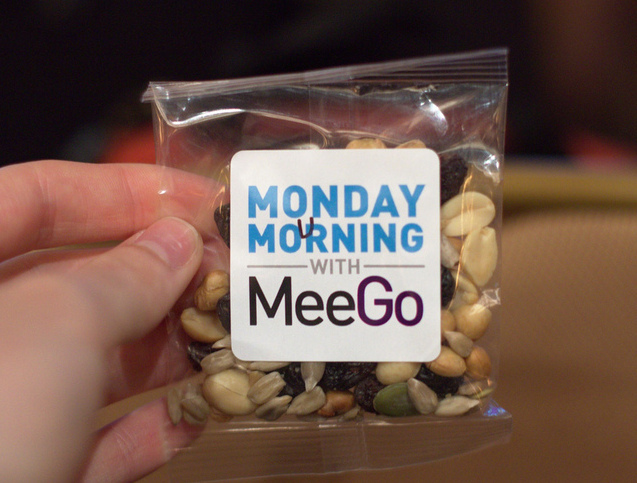
The Linux Foundation and the LiMo Foundation issued a joint statement on Wednesday morning to announce the launch of Tizen, a new Linux-based open source mobile operating system. The platform's application stack and third-party developer frameworks will be built around standards-based Web technologies. The new Tizen website says that Intel and Samsung are jointly backing the effort.
The new platform effort will displace the unsuccessful MeeGo project, an open source mobile operating system that was launched last year when Intel and Nokia sought to unify their respective mobile Linux platforms with the help of the Linux Foundation. MeeGo began to unravel when Nokia abandoned Linux in favor of Microsoft's Windows Phone 7 operating system.
Rumors began to circulate earlier this month suggesting that Intel would back away from the MeeGo mobile platform and move on to other projects. At the time, the chip maker flatly denied those reports and claimed that it was still "fully committed" to MeeGo. As we suspected, that commitment proved to be shallow.
Intel's Imad Sousou discussed the transition from MeeGo to Tizen last night in a statement on the official MeeGo blog. He contends that the new plan for an HTML-based mobile environment necessitated a clean break. He doesn't believe that MeeGo could have evolved to fulfill the technical requirements of the new vision.
"Why not just evolve MeeGo? We believe the future belongs to HTML5-based applications, outside of a relatively small percentage of apps, and we are firmly convinced that our investment needs to shift toward HTML5. Shifting to HTML5 doesn't just mean slapping a web runtime on an existing Linux, even one aimed at mobile, as MeeGo has been," he wrote. "Over the next couple of months, we will be working very hard to make sure that users of MeeGo can easily transition to Tizen."
It's still not totally clear whether Tizen marks a new beginning or is merely an exercise in rebranding MeeGo to diffuse the stink of rejection that was left by Nokia's departure. Jim Zemlin, the executive director of the Linux Foundation, revealed in a blog entry that some existing MeeGo technologies will be adopted in Tizen.
Zemlin also said that the MeeGo project will continue to coexist with Tizen to a limited extent. The Linux Foundation views Tizen as the way forward for mobile industry stakeholders, but is wiling to leave MeeGo running on life support for the benefit of community members who want to continue driving it forward independently.
Tizen's HTML-focused vision sounds conceptually similar to that of HP's gutted webOS platform or Mozilla's experimental Boot to Gecko project. It's a compelling approach, but it's not clear if it can produce a competitive mainstream mobile platform.
Intel's poor performance with MeeGo so far suggests that the chip maker is comfortable contributing at lower levels of the stack, but is ill-equipped to produce good user-facing software. Samsung's participation adds a lot of credibility to the Tizen project, because the company has a real-world track record producing consumer electronics products.
Samsung's platform strategy is internally fragmented, however. The company is already investing heavily in Android, Windows Phone 7, and its own Bada operating system. It's also worth noting that Samsung was one of the few companies that developed a MeeGo netbook.
It's not entirely clear yet how Tizen will fit into Samsung's future product lineup. Much like MeeGo, Tizen aims to target a wide range of different form factors—including smartphones, netbooks, tablets, set-top boxes, televisions, and vehicle computing systems.
It's possible that Samsung's interest in Tizen is motivated by a desire to provide a unified application ecosystem across the full span of products that the company sells. It's also possible that Samsung is looking at new mobile platforms because it is concerned about how Google's acquisition of Motorola will impact its standing in the Android ecosystem.
Zemlin says that Tizen will have an open governance model and a close alignment with upstream developers—characteristics that MeeGo shared. The opportunities offered by a truly open platform developed in a vendor-neutral environment are promising, but the litany of mistakes and disappointments that have led up to this point make it difficult to have faith in Tizen.
By starting over on the userspace stack and switching to a new set of development tools, Tizen is throwing the existing MeeGo community and a lot of open source labor under the bus. Getting existing contributors and third-party developers who were burned by MeeGo involved in the new effort could prove challenging.
Listing image by Photograph by Ryan Abel
reader comments
40